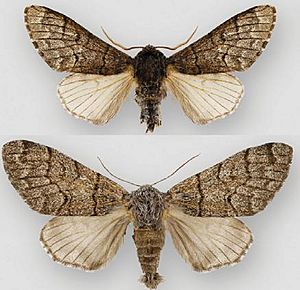Panthea gigantea facts for kids
Quick facts for kids Panthea gigantea |
|
|---|---|
 |
|
| Panthea gigantea male (top), female (bottom) | |
| Scientific classification | |
| Kingdom: | |
| Phylum: | |
| Class: | |
| Order: | |
| Family: | |
| Genus: | |
| Species: |
P. gigantea
|
| Binomial name | |
| Panthea gigantea (French, 1890)
|
|
| Synonyms | |
|
|
The Panthea gigantea is a type of moth that belongs to the Noctuidae family. This family includes many different kinds of moths, often called "owlet moths." The Panthea gigantea is special because it's known for its impressive size. It was first described in 1890 by a scientist named French.
About the Giant Panthea Moth
The Panthea gigantea is one of the largest moths in its group found in the Americas. Its name, gigantea, even means "giant," which gives you a clue about its size! Moths are insects, and like butterflies, they go through a full life cycle from egg to larva (caterpillar), then pupa, and finally, an adult moth.
Where the Giant Moth Lives
This large moth makes its home across a wide area of western North America. You can find it in warmer and drier places. Its range stretches from south-central British Columbia in Canada all the way down to Durango in Mexico.
It also lives in the United States. This includes areas like the Black Hills of South Dakota, western Nebraska, and the Texas Panhandle. From there, it spreads west to Washington, Oregon, and along the coast of California.
What the Giant Moth Looks Like
The Panthea gigantea is known for being quite big. On average, it's the largest species of Panthea found in the New World (North and South America). Some female moths of this species can have a wingspan that is more than 60 mm wide. That's about 2.4 inches, which is pretty big for a moth! The image in the infobox shows both a male and a female, so you can see how they look.
 | Janet Taylor Pickett |
 | Synthia Saint James |
 | Howardena Pindell |
 | Faith Ringgold |

